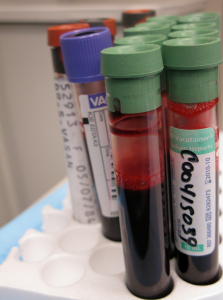Breakthrough research was published on March 9th 2014 by Dr. Howard Federoff and a team of researchers in Washington DC. They developed a blood test that identifies 10 biological markers which has been shown to determine if healthy individuals will develop Alzheimer’s Disease within two or three years. This amazing stepping stone could help individuals receive treatment before developing symptoms of this horrible neurodegenerative disease.

35 million people all over the world have been diagnosed with Alzheimer’s, the most common form of dementia, and this number is rising rapidly. The ripple effect of this disease touches many family members by having to care for them or put them in care-homes. Individuals with onset Alzheimer’s disease become confused, frustrated, and forgetful and eventually progress to where they cannot talk, feed, or even dress themselves. Alzheimer’s is a horrible disease affecting many innocent elderly people and hopefully in the near future, there will be tremendous progress in the treatment of Alzheimer’s; it may just start before symptoms even begin.
“This is a very exciting time,” says Federoff, who leads the team. He states that the test could help patients at risk of developing Alzheimer’s disease and perhaps delay or even stop the progression. “We don’t really know the source of the ten molecules,” admits Federoff, but he suggests that they reflect the destruction of neurons in the brain, which ultimately leads to cognitive impairment and Alzheimer’s disease. When neurons are destroyed in the brain, they cannot come back online or be built again.
Simon Lovestone, a University of Oxford neuroscientist is also excited about the findings in this study. “We desperately need biomarkers which would allow patients to be identified – and recruited into trials – before their symptoms begin”, says Lovestone, who is also a coordinator of a European public-private partnership that searchers for new biomarkers for Alzheimer’s.
Previous studies have emphasized treatment after diagnosis of Alzheimer’s disease, but no one has ever been completely cured. This new and important research uses blood that is easily accessible, and it has the ability to identify potential risk factors before any symptoms arise. Stopping the disease before it even happens could be an incredible advancement in this field.
Federoff highlights that larger studies must be done exploring a more diverse range of individuals including different races and ages. When these large-scale studies show positive results, perhaps early diagnoses can prevent the disease from becoming aggressive and debilitating to controlled and stable. Overall, this is very promising research that I see possibly flooding the medical field.
By Danielle Marcoux
Sources:
- http://www.nature.com/news/biomarkers-could-predict-alzheimer-s-before-it-starts-1.14834
- http://www.nature.com/nm/journal/vaop/ncurrent/full/nm.3466.html
- http://www.alz.org/alzheimers_disease_what_is_alzheimers.asp
- http://www.nia.nih.gov/alzheimers/publication/alzheimers-disease-medications-fact-sheet
- http://www.webmd.com/alzheimers/guide/treatment-overview





